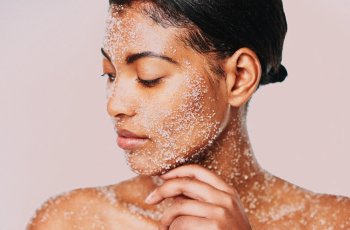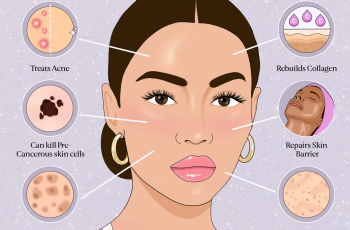
The Science of Hydrogenated Vegetable Oil in Skin Care
Hydrogenated vegetable oil is a common ingredient found in many skincare products, but how exactly does it affect your skin?
This ingredient might sound technical, but it plays an important role in formulating various lotions, creams, and other beauty products.
In this article, we will break down what hydrogenated vegetable oil is, its potential benefits, possible drawbacks, and the types of skin that may or may not benefit from this ingredient.
To ensure you’re choosing the best skincare products for your specific skin type, take our Baumann Skin Type quiz for free!
What is Hydrogenated Vegetable Oil?
Hydrogenated vegetable oil is derived from a blend of oils extracted from plant sources, such as soybeans, sunflowers, rapeseed (canola), and olives.
These natural oils contain a mixture of saturated and unsaturated fatty acids, along with antioxidants and other beneficial compounds like polyphenols and vitamin E.
The process of creating hydrogenated vegetable oil involves heating the oil blend to very high temperatures and then bubbling hydrogen gas through the mixture.
This process, called hydrogenation, alters the chemical structure of the oils, making their unsaturated fatty acids more saturated by adding hydrogen molecules.
As a result, the oil becomes solid or semi-solid at room temperature, which makes it easier to formulate into various skincare products.
While the hydrogenation process itself is relatively straightforward, the composition of the final oil can vary significantly depending on the specific types of oils used and the hydrogenation method. This variability can make it challenging to consistently predict how hydrogenated vegetable oil will behave in skincare formulations.
For example, some hydrogenated oils may offer more moisturizing benefits, while others may be more occlusive or prone to clogging pores.
Skin Benefits of Hydrogenated Vegetable Oil
Hydrogenated vegetable oil isn’t just a filler in cosmetic formulations – it has several properties that can benefit the skin in specific ways.
Here are some key benefits of hydrogenated vegetable oil in skincare:
1. Skin Barrier Repair
The skin’s natural barrier, composed of lipids like ceramides, cholesterol, and fatty acids, plays a crucial role in protecting the skin from moisture loss and environmental damage.
The fatty acids found in hydrogenated vegetable oil can help reinforce and repair this moisture barrier, preventing water loss and improving overall skin hydration.
This can be especially beneficial for those with dry, flaky, or compromised skin.
2. Anti-inflammatory Effects
Hydrogenated vegetable oil contains unsaturated fatty acids like oleic acid, which have demonstrated anti-inflammatory properties.
These fatty acids can soothe and calm irritated skin, making this ingredient helpful for individuals with sensitive skin or those prone to conditions like eczema or dermatitis.
Additionally, the presence of other fatty acids like linoleic acid and alpha-linolenic acid is often used in products aimed at repairing the skin barrier and reducing inflammation.
3. Increased Ingredient Absorption
The occlusive nature of hydrogenated vegetable oil means that it forms a protective layer on the skin’s surface, helping to lock in moisture and keep other ingredients from evaporating.
This barrier effect can also aid in the absorption and penetration of other active ingredients in skincare products.
For example, in formulations with retinoids, hydrogenated vegetable oil can help slow the absorption process, allowing these compounds to work more effectively over time.
4. Anti-aging Properties
Hydrogenated vegetable oil contains antioxidants such as vitamin E and polyphenols, which can help neutralize free radicals that damage skin cells.
Free radicals are highly reactive molecules that can lead to oxidative stress, accelerating the aging process of the skin.
By neutralizing these free radicals, hydrogenated vegetable oil may help protect the skin from premature aging and reduce the visible signs of wrinkles and fine lines.
Additionally, its presence in sunscreens can add thickness to the formula, providing more UV protection.
5. Moisturizing Properties
As a lipid-based ingredient, hydrogenated vegetable oil can help provide deep moisturization to dry, flaky skin.
By physically penetrating the skin and replenishing essential lipids, it helps to restore moisture levels and maintain hydration.
Additionally, its occlusive properties prevent the evaporation of water from the skin, leading to long-lasting moisturization.
Drawbacks of Hydrogenated Vegetable Oil
While hydrogenated vegetable oil offers several benefits, it’s not without its potential drawbacks.
Depending on your skin type and concerns, you may want to approach this ingredient with caution. Here are some considerations:
1. Comedogenicity (Pore-Clogging)
One of the primary concerns with hydrogenated vegetable oil is its occlusive nature.
While this helps lock in moisture, it can also create a barrier that traps excess oil, dirt, and bacteria inside the pores.
For individuals with oily or acne-prone skin, this can lead to clogged pores, blackheads, and the potential for breakouts.
If you have acne-prone skin, it may be a good idea to avoid products containing hydrogenated vegetable oil or opt for formulations specifically labeled as non-comedogenic.
2. Inconsistent Formula
Because the composition of hydrogenated vegetable oil can vary significantly depending on the oils used in the blend, the resulting product may not always perform the same way.
For example, some hydrogenated oils may be more hydrating, while others may have a thicker, more occlusive texture that could feel heavy on the skin.
This variability can make it difficult to predict how your skin will react, especially if you are sensitive to certain ingredients or fragrances.
3. Environmental Impact
The hydrogenation process requires high temperatures and hydrogen gas, making it more energy-intensive than the production of natural, unprocessed plant oils.
This means that hydrogenated vegetable oil can have a higher environmental impact compared to alternatives like cold-pressed oils.
Additionally, the use of certain plant-based oils in hydrogenated vegetable oil (such as palm oil) may contribute to deforestation and other environmental concerns.
If you are environmentally conscious, look for brands that emphasize sustainable sourcing or choose skincare products that utilize more eco-friendly oils.
Who Should Use Hydrogenated Vegetable Oil?
Best for:
Dry skin: The moisturizing and occlusive properties of hydrogenated vegetable oil make it an excellent choice for individuals with dry, dehydrated skin.
Mature skin: The skin barrier-repairing benefits and antioxidant properties can help restore hydration and protect against aging.
Sensitive skin: If your skin is prone to irritation, the anti-inflammatory properties of hydrogenated vegetable oil can help calm and soothe the skin.
Dull or uneven skin: The nourishing lipids in hydrogenated vegetable oil can help improve the texture of the skin and give it a healthier, more radiant appearance.
Avoid if:
Oily or acne-prone skin: The occlusive nature of hydrogenated vegetable oil can trap oil and impurities in the skin, leading to clogged pores and breakouts.
Those with skin sensitivities to oils: If you have an allergy or sensitivity to certain oils, it’s important to check the ingredient list to ensure the product doesn’t contain hydrogenated vegetable oil.
Environmental concerns: If sustainability is a priority for you, consider avoiding hydrogenated vegetable oils, particularly those sourced from palm oil or non-renewable agricultural practices.
Conclusion
Hydrogenated vegetable oil is a versatile ingredient that can offer moisturizing, anti-inflammatory, and anti-aging benefits for the skin, particularly for those with dry, mature, or sensitive skin. Its ability to repair the skin barrier, soothe irritation, and aid in the absorption of other active ingredients makes it a valuable addition to many skincare products.
However, its occlusive properties can lead to clogged pores for individuals with oily or acne-prone skin, so it’s essential to consider your skin type before incorporating products containing this ingredient.
As with any skincare product, it’s always best to choose products based on your Baumann Skin Type, as individual needs and concerns vary.
Consulting with a dermatologist can also help guide your decisions to ensure you are selecting ingredients that are best suited to your skin’s unique requirements.
Find your Baumann Skin Type by taking our free quiz today, and start your journey toward healthier, more radiant skin!


